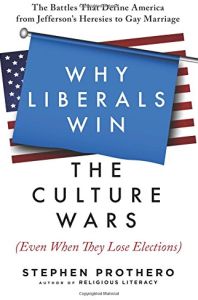Join getAbstract to access the summary!

Join getAbstract to access the summary!
Stephen Prothero
Why Liberals Win the Culture Wars (Even When They Lose Elections)
The Battles That Define America from Jefferson's Heresies to Gay Marriage
HarperOne, 2016
What's inside?
What Americans fight about and why: A report from the front lines of the “culture wars.”
Recommendation
“Culture wars” are almost as old as the American republic. The bitter election of 1800, with the Democratic-Republicans of Thomas Jefferson on the left and John Adams’s Federalists on the right, was only the beginning. In subsequent years, American conservatives and liberals argued about religious discrimination and alcohol long before their contemporary culture wars over abortion, civil rights, feminists and homosexuals. Stephen Prothero, a professor of religion at Boston University, sums it all up. Trivia buffs may find a few small miscues. For instance, most 1920s movies weren’t “talkies.” Nonetheless, Prothero proves highly readable and thought provoking. Voicing a strong historic point of view, he doesn’t let modern political correctness water down his descriptions of past conflicts. While always politically neutral, getAbstract recommends his overview for its valuable historical context and suggests it to anyone who’s had enough of the culture wars.
Summary
About the Author
Boston University professor Stephen Prothero also wrote God Is Not One and Religious Literacy.

















Comment on this summary